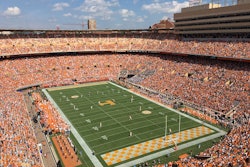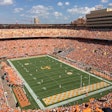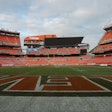Copyright 2014 Gannett Company, Inc.
All Rights Reserved
For a party that cost $51billion, the Sochi Olympics have a surprisingly simple feel.
Athletes whiz around Olympic Park on bikes and stroll among fans on their way to training or the village. All of the indoor venues are within sight -- and walking distance -- of each other. The crowds are manageable, and clowns, folk dancers and drum bands wander the park providing entertainment.
"I've never seen anything like this," said Ross Bucsis, who is experiencing his third Olympics after watching his daughter Anastasia, a Canadian speedskater, compete in Vancouver and seeing the 1988 Games in his native Calgary.
"It's just marvelous. This is more like a world's fair."
The Winter Olympics once were quaint sporting festivals. Athletes and fans from around the world would gather in picturesque mountain towns such as Lake Placid, Squaw Valley, Grenoble or St.Moritz, mixing and mingling with sports as their backdrop.
They didn't need massive, state-of-the-art venues. Figure skating and hockey, in fact, mostly were held outdoors through 1960, and the footprint of the Games was more that of a child than Big Foot.
But the current Olympics bear little resemblance to those Games of old. Venues are spread far and wide to accommodate the growing number of alpine and indoor events, and it can take a couple of hours to get between city and mountain areas. The indoor venues are usually sprawled across a city as organizers try to make some use of existing arenas.
Oh sure, there might be a central area around the flame and medals plaza. But the Winter Olympics can seem more like a series of related events than one big one.
Sochi is different. Everything in the Black Sea city had to be built from scratch -- hence the price tag -- and organizers centralized the venues in an Olympic Park, much as organizers of the Summer Games do.
"I think it's a great idea, because you can walk. I think that's great," Olympic historian David Wallechinsky said. "In general, it's a nice idea, because you're exposed to several sports at once."
Each of the venues is visible from the center of the park, and it takes about 15 minutes to walk from one side of the park to the other. The mountain venues are 30 miles away, and the trip can be made -- theoretically, at least -- in as little as 30 minutes.
"I knew everything would be really close. That was one of the appeals that brought me here," said Oliver Hunt, a Dallas resident who decided to come to Sochi after attending the London Olympics in 2012. "Instead of having to walk or drive everywhere, everything's right here."
Much has been made of the absence of fans, particularly from foreign countries. Many were scared off by security concerns, along with the high cost and difficulty of getting to Sochi. Local fans can't simply show up at the park, either, needing a spectator's pass to get in.
But that has an advantage, too. Unlike at Summer Games, where the Olympic Park can get so crowded it's almost impossible to move, there's plenty of room to roam in Sochi.
"This is a big country, and I think it's illustrative of what our country is," said Dmitri Zinchenko of Moscow. "There was no sense of making it small."
While some say there's no soul to the Sochi Olympics, the small number of people in the big park helps make for a surprisingly cozy atmosphere.
Instead of riding buses, as they do at most Olympics, athletes are riding bikes. Monday, one Polish athlete was doing laps around the perimeter of the park on a racing bike while a South Korean speedskater weaved between fans before skidding to a stop in front of Adler Arena. The Dutch athletes have a bright orange -- naturally -- fleet of bikes, and even the king and queen took them for a spin.
Athletes also have been walking or jogging in the park, easily spotted in their team uniforms.
The commercialism that has overtaken most Olympics has been toned down, too. Outside of the sponsor's village, logos other than "Sochi 2014" are either scarce or done in such a way that they blend into the scenery.
"(The intimate feel) was really important for us since it's the first time we have a real Olympic Park for Winter Games," said Aleksandra Kosterina, spokeswoman for the Sochi Organizing Committee.
"I think we're so far, so good, satisfied. But at the same time, we hope to see even more people come."
Sporting events aren't the only thing going on in the park. There are Russian folk dancers doing demonstrations, mimes performing and drum choruses playing.
Bucsis and his wife, Anita, even got a history lesson on the various Russian republics at one of the venues.
"I love that the Olympic Park has everything," Dmitri Zinchenko said. "Not only venues, but you can find anything to like."
Well, almost anything.
"The only thing is you need to walk a lot," Igor Soskov said through an interpreter. "But that's sport. That's what we came for."
Contributing: Elena Vlasova, Dan Wolken
Terms and Conditions Privacy Policy



































